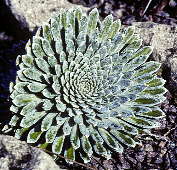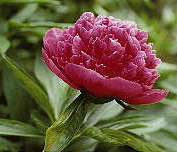|
The Order Saxifragales contains a morphologically-diverse order of 13 families and around 2300 species of dicotyledenous flowering herbs (insect-pollinated), shrubs and trees (wind-pollinated).

Saxifraga longifolia

Paeonia officinalis
Order Saxifragales includes saxifrages, peonies (Paeoniaceae), gooseberries, blackcurrants and redcurrants (Grossulariaceae), sweet gums (Altingiaceae) and witch hazels (Hamamelidaceae). The Saxifragales includes families formerly distributed in other orders including Rosales, Haloragales, and Hamamelidales but molecular analysis supported regrouping.
Succulent genera:
Some alpine Saxifragaceae might be considered borderline succulent.
Most of the succulent species are in the large family Crassulaceae, which contains around 1500 species in 34 genera, including many choice leaf succulents. A common feature of the Crassulaceae is Crassulacean Acid Metabolism (CAM). Because organic acids are used for temporary sequestration of carbon dioxide, CAM plants often taste bitter and no members of this family are important crop plants. However, many are cultivated for their horticultural merit.
Crassula helmsii (Australian swamp stonecrop) is a noteworthy invasive hardy species that grows from a small segment of stem, spreads rapidly and chokes waterways with floating mats of weed. The succulent stems and leaves allow it to prosper on dry land near to water. Until recently, it was distributed through the water-gardening and aquarist trade.
|

 Families of Succulent Plants
Families of Succulent Plants 





